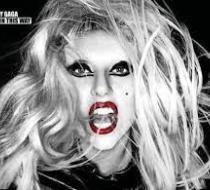Lady Gaga’s ‘Born This Way’ Is Still Revolutionary Favorite
Lady Gaga said something interesting about her song “Born This Way” during a March 2011 interview at Google headquarters. “What's so funny [is] when I put that song out, everybody was like, ‘Oh, the lyrics are so literal,’ and I'm like, ‘Yeah,’” she shared, almost with a fuck-you cadence. She wasn't angry—but you could tell how important the track was to her, and how she didn't want its message muddled.
Because up until that point, a lot of her messages were. If you stanned Gaga in the early 2010s—like I did, and still do—you spent a lot of time explaining her work to…well, everyone. To most, she was just a wacky, flash-in-the-pan pop star who wore meat dresses, Kermit the Frog outfits, and hatched out of “eggs” at the Grammys. Never mind every piece of clothing she wore had purpose—some statement about fame or sex or social justice she was trying to make.
Her music suffered the same issue. Beneath the glossy choruses of songs like “Poker Face” and “Bad Romance” were true confessions—insights into how Gaga viewed life, love, and herself. But all that talk of “Vertigo shtick” and disco sticks made the messages dead upon arrival for some.
From what Gaga's said about “Born This Way,” it's almost as if she worked overtime to make sure that didn't happen. This time the message was too important. The pop icon, who had made her stance on LGBTQ+ rights clear in interviews, was taking that stance to the airwaves in a way no one had before. Granted, gay empowerment pop wasn't exactly novel in 2011. In the ’90s, Madonna’s “Vogue” served as an anthem for self-expression. Twenty years later, Katy Perry told her fans—many of them LGBTQ+—that they were fireworks.
But these messages weren't lyrically explicit: Queer and straight people alike could take what they wanted from them. Depending on who you are, “Firework” is either graduation or gay canon. That ambiguity was understandable then: Pop music needed to sell, and maybe it wouldn't if it was capital-G gay. Even Christina Aguilera's “Beautiful”—which included two men kissing in the video—had lyrics everyone could relate to, so, naturally, it was a radio hit.
“Born This Way” was too. The song reached number one in more than 20 countries. According to Pop Crave, it stayed atop the Billboard Hot 100 for six weeks and became the fastest-selling song in iTunes history. That success means something—especially because this isn't a subliminal queer song, like “Firework” or “Vogue.” This is a song specifically for LBGTQ+ people—and it became a worldwide sensation, effectively dismantling the idea that gay is niche.
“I'm beautiful in my way, ’cause God makes no mistakes,” Gaga sings, referencing common “coming-out” rhetoric. “I’m on the right track, baby, I was born this way.” If this isn't clear enough, read the bridge: “No matter gay, straight, or bi, lesbian, transgender life. I'm on the right track baby, I was born to survive.” (Gaga herself identifies as bisexual.)
The song drew necessary criticism upon its arrival. Asian American and Latinx listeners were not pleased with Gaga’s use of the words Orient and chola in the bridge. It wasn't okay then, and it's not now. But the queer criticism around the song is a bit less defined. Detractors of “Born This Way” view the song as pandering and too simplistic; I see things differently. For a mainstream song to explicitly and intentionally embrace queer identity—no matter how “simple”—was revolutionary. “Born This Way” came at a time when discussions about gay teen suicide were reaching all-time highs, and shows like Glee were trying to normalize queer love onscreen. Gay identity was still on the fringes of culture, and that very much affected how gay teens lived their lives.
Then along came “Born This Way,” a song that wasn't just telling you to “vogue” or be a “firework” or that you're beautiful. It was screaming at you, in the plainest language possible, that you were queer—magically, perfectly, beautifully queer—and the biggest pop star in the world saw you. Sure, maybe that is simple when examined critically. Maybe “Born This Way”’s success can be partially attributed to the empowerment “trend” of 2010s pop. But to an 18-year-old gay boy growing up in South Carolina, none of that mattered. Hearing my sexual orientation acknowledged on top-40 radio—that was what mattered.
The rest of Gaga's Born This Way album taps into her love of metaphors. Songs like “Judas” and “Electric Chapel” use religious iconography as conduits for larger themes—and she tackles sex, partying, and other pop tropes with a puzzling, techno-grease gusto only she can pull off. But I'm happy “Born This Way” doesn't follow this trend. Its simplicity is actually one of its biggest strengths, in my opinion. We talk constantly about how representation matters—how just seeing yourself reflected onscreen can do wonders. I know for myself and many, many other queer people, hearing ourselves was just as impactful.
Having the words gay, bi, lesbian, and—perhaps most important—transgender sung loudly and clearly on a massive pop hit was life-affirming. It was life-changing. And knowing everyone understood it, even the people who scratched their heads at Gaga's meat dress, made it all the better. I came out to my parents in 2011, and I don't think I would have, had “Born This Way” not existed. It was the nudge I needed to step out from the shadows and into my identity. My mom still texts me whenever she hears that booming, bombastic chorus.
Frankly, there hasn't been a song like it since. Ten years later, and music still hasn't delivered another mainstream smash that so overtly addresses LGBTQ+ identity. And we need one. Pop culture, music in particular, is still deeply underserving queer communities. The work isn't done. Lady Gaga got us on the right track, baby, but there's still a ways to go.






